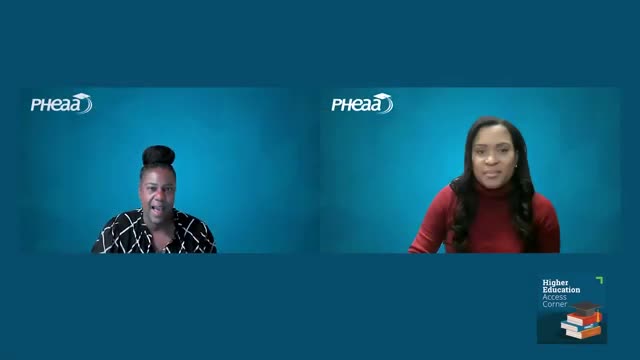PHEAA urges students to file 2025–26 FAFSA during Week of Action; schedules statewide help sessions
Get AI-powered insights, summaries, and transcripts
Subscribe
Summary
The Pennsylvania Higher Education Assistance Agency and partner organizations promoted FAFSA Completion Week (Jan. 13–17) and announced additional in-person and virtual FAFSA workshops statewide, while advising students and contributors to create studentaid.gov IDs early to avoid delays.
The Pennsylvania Higher Education Assistance Agency and its access partners urged students and families to complete the 2025–26 FAFSA during FAFSA Week of Action (Jan. 13–17) and promoted a series of follow-up workshops across the state.
PHEAA host Tiffany DeVann said the Department of Education has designated Jan. 13–17 as a FAFSA Week of Action and encouraged families to use resources — including PHEAA’s 13 higher education access partners — to finish the form. “Studentaid.gov. That is the Department of Education’s primary website for all things financial aid, as well as to complete the FAFSA,” DeVann said.
The discussion focused on why completing the 2025–26 FAFSA matters for students planning enrollment between July 1, 2025, and June 30, 2026, and on common technical and account issues that can delay submission. An access partner staff member said the 2025–26 rollout has been smoother than the prior year’s rollout, and that many families have completed the form quickly at local workshops: “So far, things have been pretty much going well. And I’ve had some be done in, like, 10, 15 minutes,” the access partner staff said.
Speakers emphasized the FAFSA’s role as the foundational application for need-based aid, federal student loans, institutional aid and many scholarships. “Unless you’re paying completely out of pocket, if you want any type of assistance, financial assistance for your student to go to college, you wanna make sure that your student completes that free application for Federal Student Aid,” the access partner staff said. They also warned that naming parents or other contributors on the form does not make them legally responsible for student loans.
Panelists detailed technical hurdles they still see: problems creating studentaid.gov accounts, mismatches between credentials and Social Security Administration records, and phone numbers tied to previously created studentaid.gov accounts. The speakers recommended creating studentaid.gov IDs several days before starting a FAFSA and said the Department of Education suggests leaving a previously used cell phone number blank and using an email address for verification if the system flags a number as already in use.
PHEAA said it and its 13 access partners ran more than 40 FAFSA completion sessions statewide during Jan. 13–17 and listed additional public events: a PHEAA-hosted public FAFSA completion event and a statewide financial aid webinar with Representative Hanbidge on Jan. 30; a session at Robert Morris University on Feb. 4; a JCC College Connect event on Feb. 10; and a statewide virtual completion event with all access partners on Feb. 19. PHEAA also pointed to online resources, language guides in the 10 most common non-English languages and interpreter services in more than 60 languages.
Speakers urged counselors and community organizations to share resources and to contact PHEAA or local access partners for one-on-one help. No formal votes or policy changes were discussed during the segment.
PHEAA’s announcements aim to boost FAFSA completion ahead of institutional and state deadlines and to reduce file delays caused by account creation or credential mismatches. For people completing the FAFSA, panelists recommended allowing several days to create studentaid.gov IDs, carefully matching contributor names and dates of birth to Social Security Administration records, and using PHEAA’s event calendar and Department of Education help resources if problems arise.
